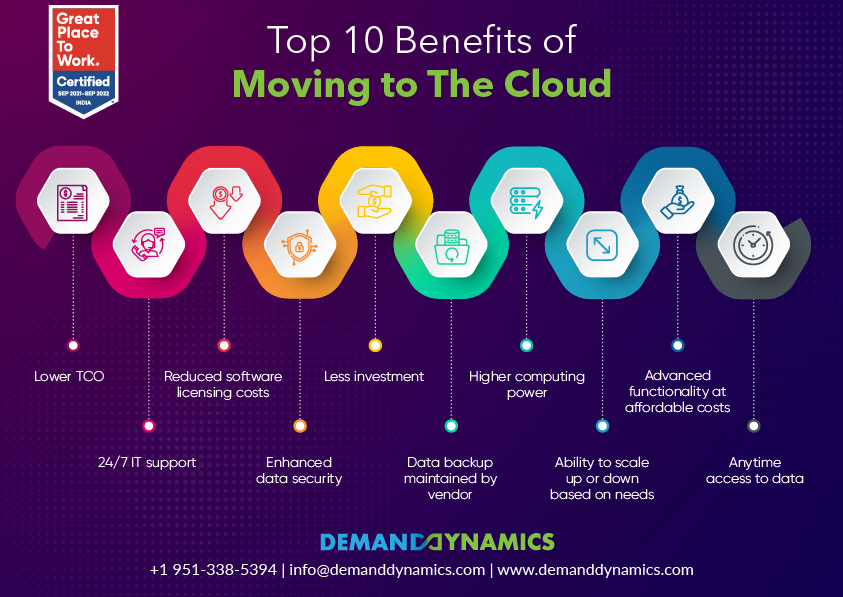Benefits of Moving to the Cloud
In today’s digital age, businesses are constantly seeking ways to improve their operations and stay ahead of the competition. One such solution that has gained immense popularity is moving to the cloud. In this article, we will explore the numerous benefits of migrating your business to the cloud and how it can give you a competitive edge.
Enhanced Flexibility and Scalability
One of the primary advantages of moving to the cloud is the enhanced flexibility and scalability it offers. Traditional on-premises infrastructure often limits businesses in terms of storage and computing power. However, with cloud computing, you can easily scale your resources up or down based on your requirements. This allows you to adapt to changing business needs and avoid unnecessary expenses.
Cost Savings
Moving to the cloud can significantly reduce your IT costs. Traditional infrastructure requires substantial upfront investments in hardware, software licenses, and maintenance. In contrast, cloud services typically operate on a pay-as-you-go model, where you only pay for the resources you use. This eliminates the need for costly hardware upgrades and allows you to allocate your budget more efficiently.
Improved Collaboration and Accessibility
The cloud enables seamless collaboration and accessibility for businesses of all sizes. With cloud-based tools and applications, employees can work together on projects in real time, regardless of their physical location. This promotes teamwork, enhances productivity, and eliminates the limitations of traditional office-based work. Additionally, cloud-based solutions can be accessed from any device with an internet connection, providing employees with the flexibility to work remotely.
Enhanced Security and Data Protection
Security is a top concern for businesses when it comes to data storage. Cloud service providers invest heavily in advanced security measures to protect your data from unauthorized access, data breaches, and physical damage. They employ robust encryption techniques, regular backups, and disaster recovery plans to ensure the safety and integrity of your valuable business information. By moving to the cloud, you can benefit from enterprise-level security without the need to invest in expensive security infrastructure.
Increased Reliability and Business Continuity
Traditional on-premises systems are susceptible to hardware failures, power outages, and natural disasters. These incidents can lead to significant downtime and disrupt your business operations. However, cloud service providers have redundant systems in place to ensure high availability and business continuity. They distribute your data across multiple servers and data centers, minimizing the risk of data loss and providing reliable access to your applications and services.
Environmental Sustainability
Moving to the cloud not only benefits your business but also contributes to a greener environment. By leveraging cloud services, you can reduce your carbon footprint by optimizing resource utilization. Cloud providers consolidate their infrastructure, leading to higher energy efficiency and reduced power consumption compared to traditional on-premises setups. Embracing the cloud can align your business with sustainable practices and demonstrate your commitment to environmental responsibility.

In conclusion, moving to the cloud offers numerous benefits that can transform the way your business operates. It provides enhanced flexibility, cost savings, improved collaboration, and accessibility. Additionally, it offers enhanced security, and increased reliability, and contributes to the environment and sustainability. By embracing the cloud, you can gain a competitive edge and position your business for future success.
Frequently Asked Questions – Benefits of Moving to the Cloud
1. What are the main advantages of migrating to the cloud?
There are several benefits of moving to the cloud, including:
Cost savings
Scalability and flexibility
Improved collaboration and accessibility
Enhanced security and disaster recovery
2. How does cloud migration help in reducing costs?
Moving to the cloud eliminates the need for on-premises infrastructure, reducing hardware and maintenance costs. Additionally, cloud providers offer pay-as-you-go pricing models, allowing organizations to pay only for the resources they use.
3. Can cloud migration improve scalability and flexibility?
Absolutely! Cloud services provide the ability to easily scale resources up or down based on demand. This flexibility allows businesses to quickly adapt to changing needs without the hassle of procuring and configuring new hardware.
4. How does the cloud enhance collaboration and accessibility?
Migrating to the cloud enables teams to access files and applications from anywhere with an internet connection. This fosters collaboration among remote or geographically dispersed employees, leading to increased productivity and efficiency.
5. Is data more secure in the cloud?
Cloud providers invest heavily in security measures to protect customer data. They employ advanced encryption techniques, regular backups, and robust access controls, making the cloud a secure option for storing and managing sensitive information.
6. How does the cloud ensure disaster recovery?
Cloud platforms offer automated backups, redundant storage, and geo-replication, ensuring that data remains safe even in the event of hardware failures or natural disasters. This enhances business continuity and minimizes downtime.
7. Can cloud migration improve application performance?
Yes, cloud providers offer high-performance infrastructure and advanced networking capabilities. By leveraging these resources, organizations can enhance application performance, reduce latency, and provide a better user experience.
8. Are there any environmental benefits to moving to the cloud?
Cloud computing promotes environmental sustainability by reducing the need for physical servers and data centers. This leads to lower energy consumption, decreased carbon footprint, and overall environmental impact.
9. How does cloud migration enable easier software updates?
Cloud providers handle software updates and maintenance, relieving organizations from the burden of manually installing patches or upgrades. This ensures that applications are always up-to-date with the latest features and security enhancements.
10. Can moving to the cloud improve disaster resilience?
Absolutely! Cloud platforms offer geo-redundancy and data replication across multiple regions, making them highly resilient to disasters. In case of a localized outage, services can seamlessly failover to another region, minimizing disruptions.




